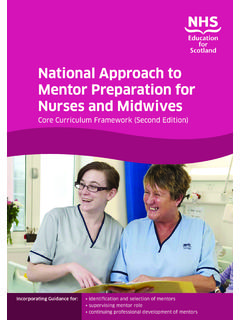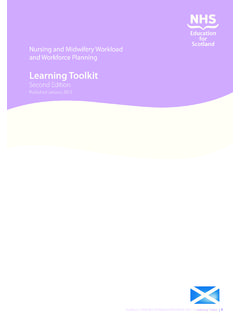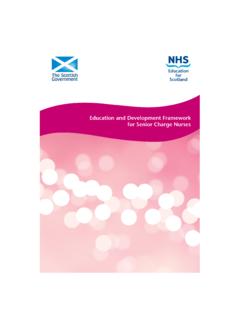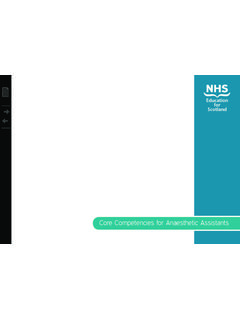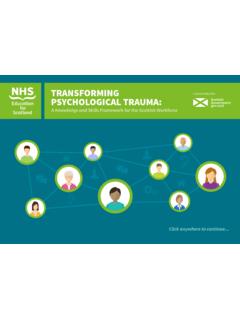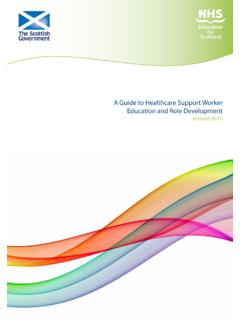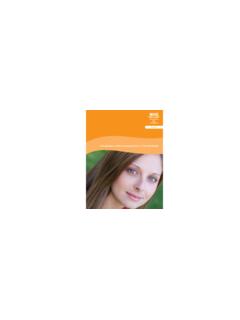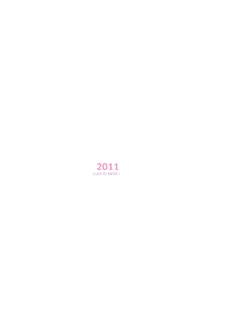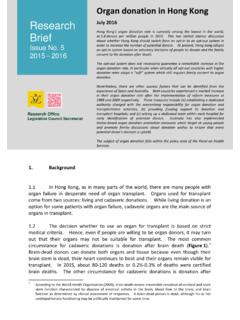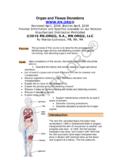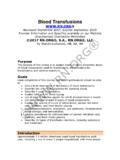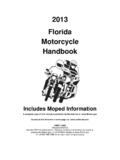Transcription of for Healthcare Staff
1 A Multi-Faith Resource for Healthcare StaffSpiritual Care2 Multi-Faith Resource for Healthcare StaffNHS Education for Scotland (NES) produced this booklet through its Healthcare Chaplaincy Training and Development Unit. It was prepared with the guidance of the Spiritual Care Development Committee, a multi-faith group which represents the main faith and belief groups in Scotland and also includes representatives from chaplaincy, the health service and the Scottish Executive Health Department. The group is a forum for discussing ideas and issues concerning spiritual and religious care within NHS Scotland. 3 ContentsPageIntroduction Baha i Faith Brahma Kumaris Buddhism Chinese Christianity Church of the Latter-day Saints (Mormon) Hinduism Humanism Islam Jehovah s Witnesses Judaism Paganism SikhismMental Health.
2 A noteSources Web sitesContactsOnline at Large-print versions are available from Healthcare Chaplaincy Training and DevelopmentNHS Education for Scotland, 2 Central Quay, 89 Hydepark Street, Glasgow G3 8BW46810131618202325283034363940414244 IntroductionScotland is a religiously and culturally diverse country and this resource is designed to assist NHS Staff to address some of the religious needs of patients in their care. The Scottish Executive has stated that spiritual care, which includes but is not limited to religious care, must be provided in an equal and fair way for those of all faith communities or none. To enable this, all Boards have produced a spiritual care policy and work is being done to develop culturally competent standards for spiritual and religious care. Most Boards now have a Department of Spiritual and Religious Care staffed by a chaplaincy team, who are a good source of knowledge and experience on how to serve the needs of a multi-faith population.
3 Often the chaplaincy will be the first place people call when seeking advice or help in finding the right care. Chaplaincy teams help to facilitate spiritual or religious care for all, whatever their faith or life stance happens to be. They will usually know who to contact when a person asks to see someone from a particular faith in doubt ask the patientYou can resolve many of the issues arising from caring for people from a faith community or culture unfamiliar to you by simply asking the patient, or their visitors, how they wish to be looked after. It is polite, for example, to ask how a patient wishes to be addressed. This is important because not all cultures have a pre-name then a surname. When in doubt, ask. It is also worth noting that, in some cultures, it is not acceptable for men and women to shake hands in booklet may not cover all faith communities and relevant issues. Therefore it is essential to talk to the patient about their health needs. All NHS Boards should offer access to interpreting services and it is essential to use these services when a patient has difficulty communicating their you know a person s faith community or group, you should be able to use this document to deal with the main areas which may be relevant.
4 The communities covered in this document are: Baha i faith Brahma Kumaris Buddhism Chinese Christianity Church of Jesus Christ of Latter-day Saints (Mormon) Hinduism Humanism Islam Jehovah s Witnesses Judaism Paganism Sikhism. Although Chinese does not represent a religious community, we decided to include a Chinese section as various religions are found in the Chinese community and there are particular practices that are specifically document gives information, in the same order, for each of the communities listed above. The format is as follows: Introduction Attitudes to Healthcare Staff and illness Religious practices Diet Fasting Washing and toilet Ideas of modesty and dress Death customs Birth customs Family planning Blood transfusions, transplants and organ donation66 Baha i FaithIntroductionThe Baha i faith is an independent world religion that originated in Persia (now Iran) in the middle of the 19th century.
5 Its founder is called Baha u llah (Glory of God). Baha u llah announced that he was a messenger from God sent to help bring about a new age of global civilisation which would be characterised by unity and peace. Baha u llah was persecuted and finally exiled to Akka (Acre) in Palestine where he died in 1892. The spiritual and administrative centre of the Baha i faith is thus in present-day key Baha i beliefs are that: there is one God each person has a soul that lives on after death all religions have a common foundation men and women should have equal opportunity prejudice of all kinds should be challenged extremes of wealth and poverty should be abolished religious and cultural diversity should be respected. Attitudes to Healthcare Staff and illnessMost Baha is have a positive attitude towards Healthcare Staff and are willing to seek medical help and advice when sick. As well as taking prescribed medication, Baha is believe in the power of prayer in practicesBaha is must usually recite daily prayers.
6 Although in illness Baha is are exempt from these prayers, some may still wish to recite them, and would therefore appreciate is have no specific dietary requirements. Some Baha is may be vegetarian but this is a personal choice, not a religious requirement. The use of alcohol and habit-forming drugs is strictly prohibited except when prescribed by a physician. Smoking is Baha i fast takes place every year from 2 20 March inclusive; at this time Baha is may not take food or drink from sunrise to sunset. Fasting is not obligatory during sickness or pregnancy, while breastfeeding or menstruating, during hard physical labour, or on long journeys, and people under the age of 15 or over 70 are exempt from fasting. 77 Washing and toiletWashing and toilet present no unusual problems for Baha is, although they prefer to have access to water for ablutions before prayers. Ideas of modesty and dressThere are no particular points to be noted in this area and few Baha is would object to being examined by doctors of the opposite sex.
7 Death customsBaha is treat the body of a deceased person with great respect. Baha i law prescribes that burial should take place at a distance of no more than one hour s journey from the place of death. The body should not be cremated or embalmed. Funerals are normally arranged by the family of the deceased if available, or on occasions by the Baha i Assembly (usually listed in the phone book). Baha i relatives or friends will wish to say prayers for the dead. Autopsies and post mortem examinations are acceptable if necessary. Because they believe life begins at conception, a miscarriage is a great loss and the foetus should be treated with respect. Wherever possible the remains should be returned to the parents or local Baha i community for customsThe birth of a child is a time of joy and Baha is may wish to express their gratitude to God with prayer; but they have no rituals associated with planningFamily planning is left to the personal conscience of a Baha i, but please bear the following in mind.
8 Irreversible sterilisation in either sex is discouraged unless there is a medical condition relevant to the decision, in which case the individual would seek qualified medical advice. Abortion is permitted only where there are strong medical grounds such as risk to the mother s life and health. Abortion is not regarded lightly and is not permitted as a contraceptive measure. Many Baha is will not use the intra-uterine device for contraception as they regard it more as an abortive measure than a contraceptive. Artificial insemination and in-vitro fertilisation are permitted provided that the wife s egg is fertilised by the husband s sperm and that the child is born from the womb of the natural transfusions, transplants and organ donationMost Baha is would have no objection to blood transfusions and may receive transplants or donate organs for transplant. 88 Brahma KumarisIntroductionThe Brahma Kumaris World Spiritual University (BKWSU) was founded in 1937 in Hyderabad Sind (then in India) by Brahma Baba, a businessman and philanthropist.
9 Brahma Baba had a vision of how people of all cultural backgrounds could come together to rediscover and develop the spiritual dimension of their BKWSU core curriculum is offered in the form of a foundation course in meditation, based on the teaching of Raja Yoga. Raja Yoga is viewed as a path to understanding and knowing one s identity as a spiritual being. Activities focus on developing a sense of self-worth and respect for others. There are currently 8,000 BKWSU centres in 90 countries, including five in Scotland. The international headquarters are in Mt Abu, Rajasthan, India and the International Co-ordinating Office is based in Global Co-operation House, London. Brahma Baba set up a trust of 12 women to run the organisation and this system has continued, with mainly women running BKWSU centres. Today the University is headed by two women now in their 80s and 90s, Dadi Prakashmani and Dadi to Healthcare Staff and illnessMost Brahma Kumaris have a positive attitude towards Healthcare Staff and would be willing to seek medical help and advice when sick.
10 Decisions about where to seek advice and the type of treatment are left to the practicesThe Brahma Kumaris practise meditation regularly, health permitting, especially in the early hours of the morning, and it may be helpful for them to have access to a quiet area for this. DietBrahma Kumaris are encouraged to eat a lacto-vegetarian diet (dairy products permitted) and discouraged from using alcohol, tobacco and other recreational drugs. Most Brahma Kumaris do not use onions or garlic in cooking and prefer to have their food cooked and blessed by fellow Brahma is no religious obligation for Brahma Kumaris to and toiletBrahma Kumaris take a shower each morning (showers are preferred to baths wherever possible). Brahma Kumaris also observe the discipline of bathing or showering after a bowel movement and would prefer to do this in hospital too, wherever of modesty and dressAs Brahma Kumaris teachers live a celibate life they may prefer medical examinations to be undertaken by someone of the same sex.
